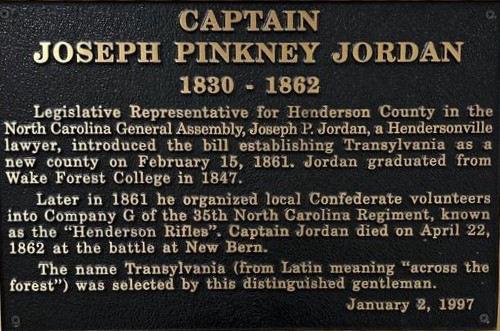
Note: This article is part of a series on street namesakes in Brevard.
When Transylvania County was founded in 1861, many of the earliest organizers had streets named for them in honor of their contributions to the town. The next founder to be highlighted in this series is Captain Joseph P. Jordan, the namesake for Jordan Street which runs from Rice Street to South Oaklawn Avenue, parallel to Main Street.
Joseph P. Jordan was the son of Joseph Sr. and Hannah (Davis) Jordan in the Blantyre area (towards Etowah, just before the Henderson County line). The area was considered Buncombe County when he was born, Henderson County by 1838, and finally became part of Transylvania County. He was the grandson of Archibald Jordan, a Revolutionary War veteran who was credited with building the first bridge across the upper part of the French Broad River.
Joseph P. Jordan grew up on the family farm and later attended Wake Forest College and studied law. He practiced in Hendersonville and was a state legislator for Henderson County. Henderson Heritage website says he was a leader of the River Party, which appears to reference those that “wanted to build a town and [Henderson] county seat near the French Broad River at today’s community of Horse Shoe.” With Marcus Erwin, he introduced the bill to create Transylvania County in 1861. Jordan is considered responsible for naming the area Transylvania, which in Latin means “across the woods.” However, Transylvania County Heritage Vol. 3 notes that the name was likely suggested to Jordan by Marcus Erwin (a lawyer who attended Kentucky’s Transylvania University). Historian Mary Jane McCrary also attributed Jordan’s bill with naming Brevard, “a tribute to Ephraim Brevard, who was esteemed for drafting the Mecklenburg Declaration, and was an officer in the Revolution Army and a citizen of renown.”
In 1861, Jordan joined the Confederate army and acted as Captain for Company G, 35th NC Troops, otherwise known as the “Henderson Rifles.” By 1862, the Regiment was involved in the Battle of New Bern and while there were casualties, many also suffered from disease. Joseph P. Jordan died on April 22, 1862. An edition of The Weekly Standard (Raleigh, NC) published his obituary:
“We regret to record the death of Capt. Joseph P. Jordan, of Henderson County, commanding company G, of the 35th regiment. Captain J. was taken ill with typhoid fever before the battle of Newbern, and was removed to this City, and had been confined ever since under medical treatment, at the Yarborough House. A few days ago we learned he was better and likely to recover, but on Tuesday morning last he grew worse and died suddenly. His remains were carried home for internment. Capt. J. was a good citizen and soldier, and a useful member of the House of Commons.” One online source says he was buried in Mt. Moriah Cemetery in Calvert, but no evidence was found in the library’s local history collection in the cemetery records.
While Jordan never married and had no direct descendants, his great, great nieces and nephews, along with help from the North Carolina Department of Cultural Resources and a number of other individuals, conducted research about Jordan’s life and petitioned the Board of Commissioners for a monument or plaque in Jordan’s honor. On May 16, 1997, Jordan was commemorated for his role in forming and naming the county with a plaque, which still hangs in the Transylvania County Courthouse. Along with this plaque, his impact on the county is remembered in the name of Jordan Street.
Photographs and information for this column are provided by the Rowell Bosse North Carolina Room, Transylvania County Library. Sources are available upon request. This article was written by Local History Associate Erin Weber Boss. For more information, comments, or suggestions, contact NC Room staff at [email protected] or 828-884-1820.



